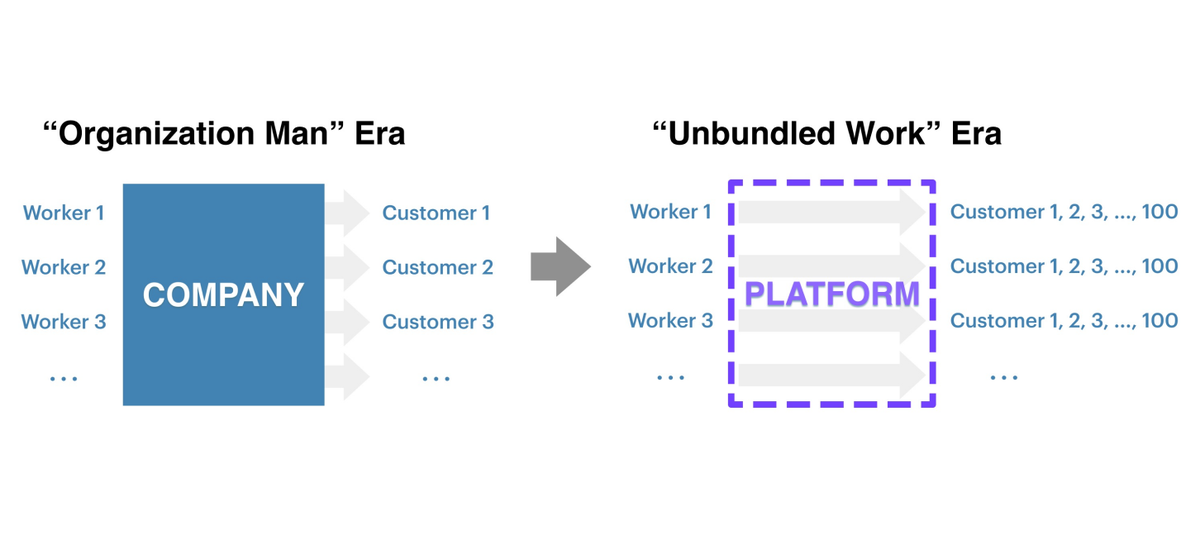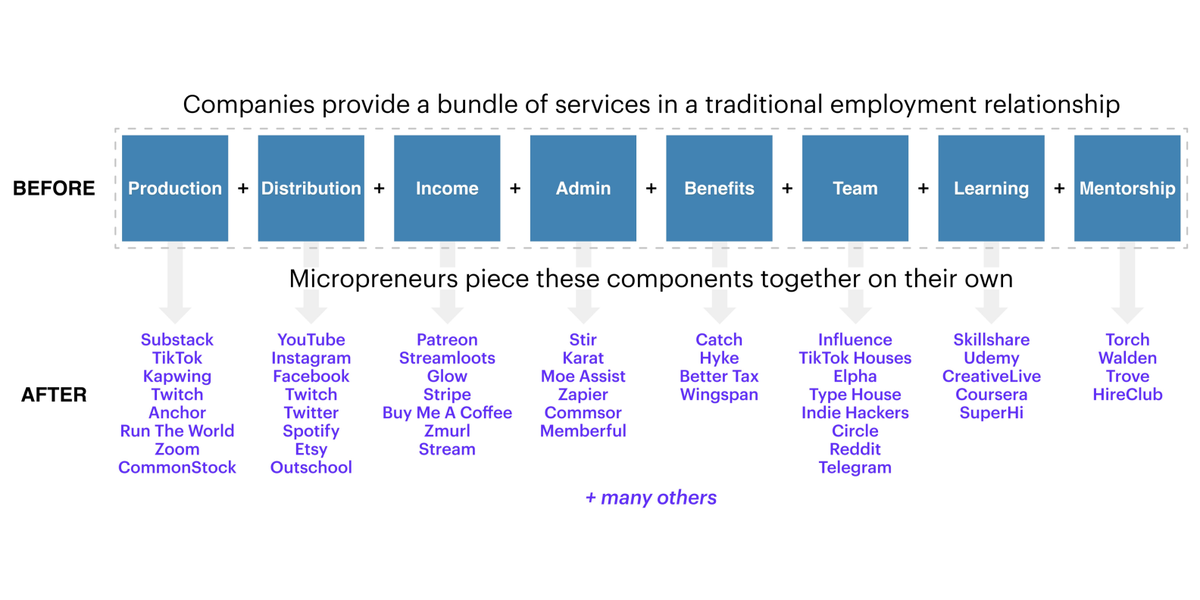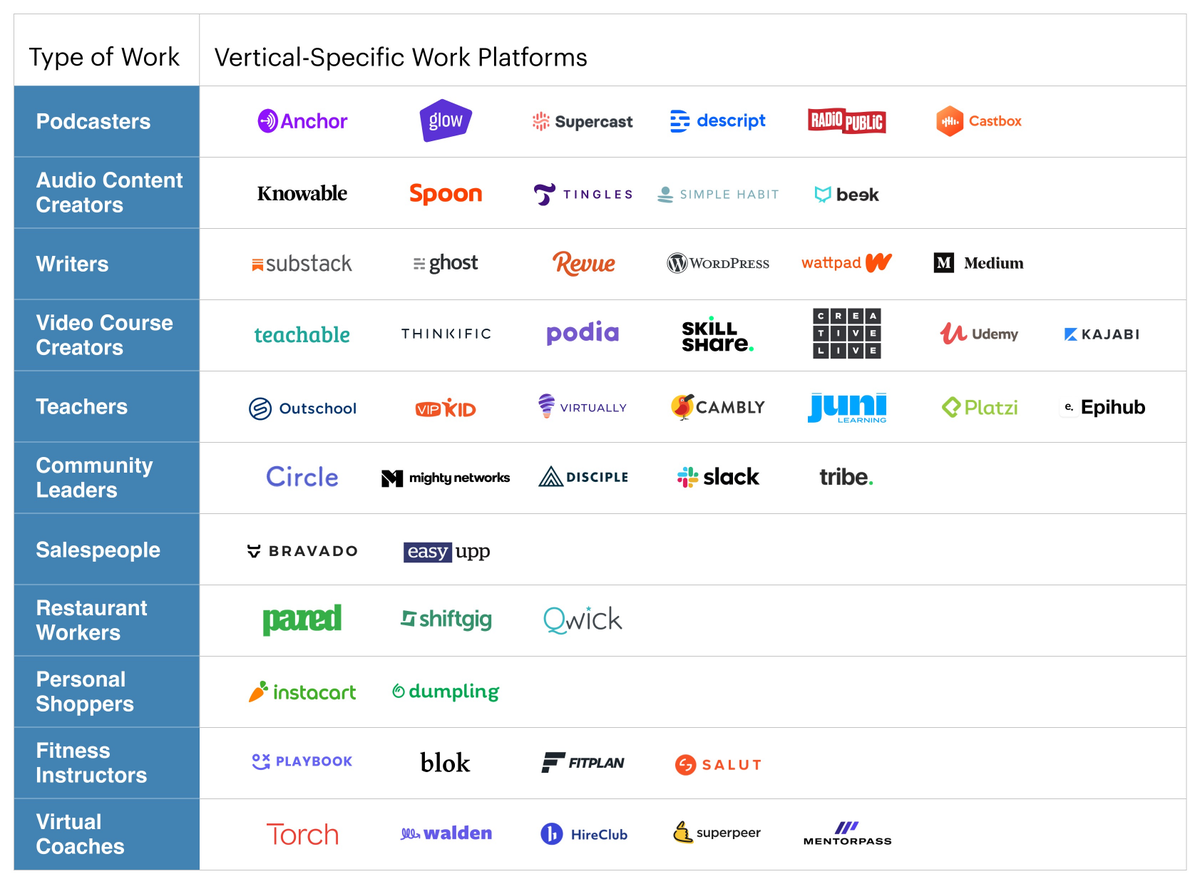At the turn of the 20th century, in the wake of the Industrial Revolution, agrarian society and cottage industries gave way to urbanization, mass production, and corporate employment.
Now, new internet platforms are empowering a shift in work once again..
li.substack.com/p/unbundling-w…
Now, new internet platforms are empowering a shift in work once again..
li.substack.com/p/unbundling-w…
We’re in the midst of a massive rearrangement in how work, and thus society, is organized. We’re going from the “Organization Man" Era to the “Unbundled Work" Era. 

Digital platforms remove the gatekeeper of the company, and empower individuals to create products, reach customers, and earn income without needing an employer.
Call these independent workers whatever you want: micro-entrepreneurs, creators, free agents, or freelancers.
Call these independent workers whatever you want: micro-entrepreneurs, creators, free agents, or freelancers.
These micro-entrepreneurs aren't just doing rote work as dictated by a platform, they're often leveraging skills, creativity, and knowledge and have greater ownership and autonomy.
Platforms are giving them the underlying tools they need to build and grow their own businesses.
Platforms are giving them the underlying tools they need to build and grow their own businesses.
What is the ecosystem of companies needed to support this trend?
Traditional employment is itself a bundle of income, benefits, team, learning, etc.
Independent workers must piece these elements together on their own, creating opportunities for vertical & horizontal platforms👇
Traditional employment is itself a bundle of income, benefits, team, learning, etc.
Independent workers must piece these elements together on their own, creating opportunities for vertical & horizontal platforms👇

Vertical (industry-specific) work platforms can:
- Expand the market to new workers by making it easier to create something
- Provide deeper value in managing a business
- Reintroduce services lost from employers
- Foster network effects: connecting to other workers & customers
- Expand the market to new workers by making it easier to create something
- Provide deeper value in managing a business
- Reintroduce services lost from employers
- Foster network effects: connecting to other workers & customers

On the other hand, horizontal work platforms excel when:
- They act as a top-of-funnel discovery destination for consumers
- There's fragmented creator tools
- There are economies of scale
- There's common infrastructure/services needed across verticals (e.g. project management)
- They act as a top-of-funnel discovery destination for consumers
- There's fragmented creator tools
- There are economies of scale
- There's common infrastructure/services needed across verticals (e.g. project management)
While past work platforms largely focused on connecting consumers with workers and honed in on enabling transactions, there’s a lot more to work than just earning income.
To legitimize independent workers and creators, there needs to be dedicated tools to support managing and growing their businesses, forging new connections, learning new skills, and connecting to work opportunities.
What's next?
Looking forward, as individuals professionalize and take their businesses to the next level, I anticipate more re-bundling—whether it’s short term collaborations with other micro-entrepreneurs, or building out teams that work together for longer-term projects.
Looking forward, as individuals professionalize and take their businesses to the next level, I anticipate more re-bundling—whether it’s short term collaborations with other micro-entrepreneurs, or building out teams that work together for longer-term projects.
Digital platforms that lower the barriers to micro-entrepreneurship can support the growth of these workers, in whichever directions they seek.
Building something here? I would love to chat!
Building something here? I would love to chat!
Thank you to the talented @brndnwll for designing the images for this post - he's available for freelance projects! Work with him!
Thank you for reading drafts: @arampell, @mignano, @jarroddicker, @nbashaw, @conradwa, @blakeir, @lennysan, @jessewldn, @blainelight, @ronojoy, @VictorPontis, @danqing_liu, @Alber_Emege, @nbt, and @samyamiam!
• • •
Missing some Tweet in this thread? You can try to
force a refresh




